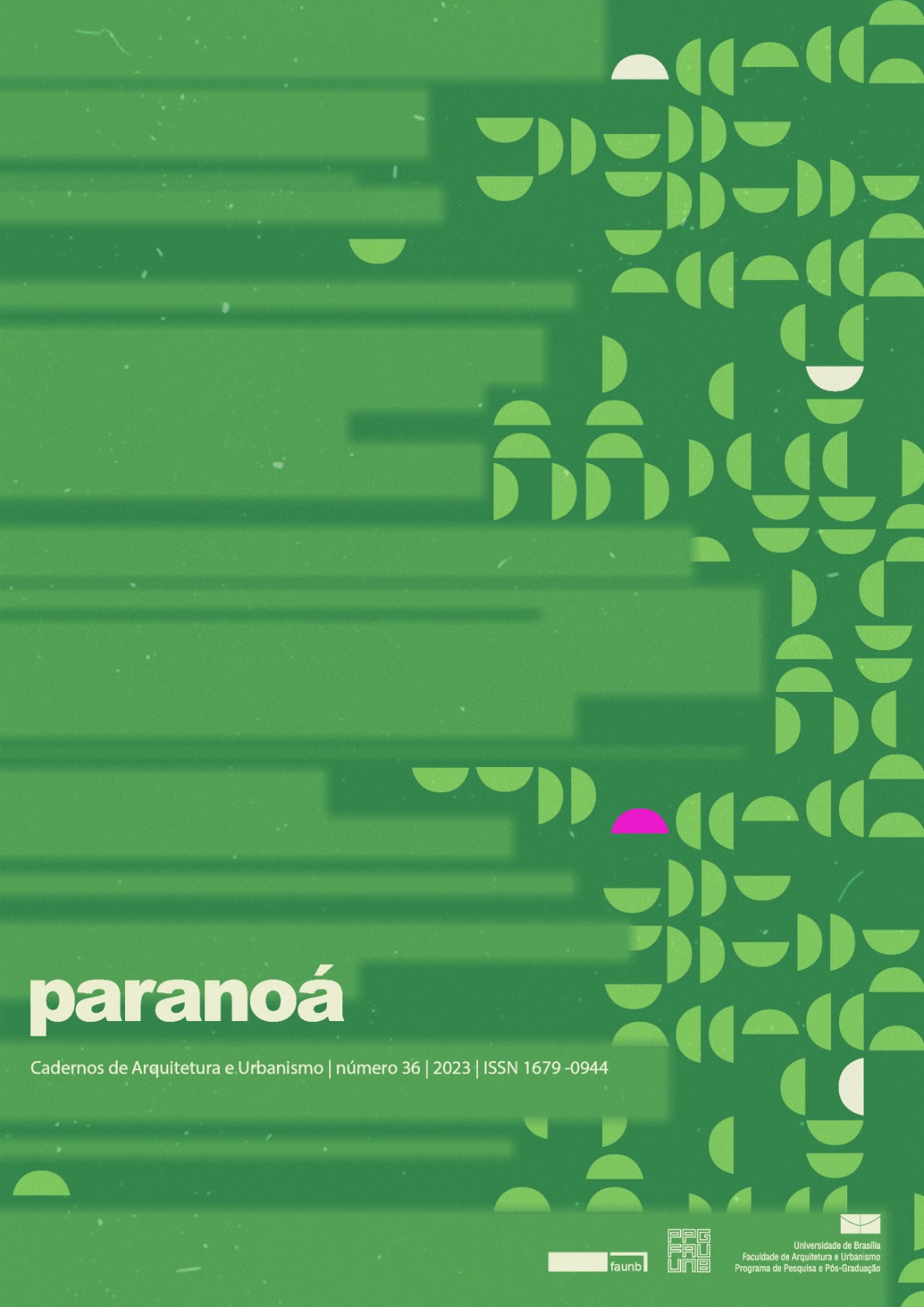Processes generators of the informal occupation: Case of study in the city of Rio dos Cedros/SC
DOI:
https://doi.org/10.18830/issn.1679-0944.n36.2023.09Keywords:
land regularization, urbanization, urban legislation, urban spaceAbstract
The brazilian urbanization process created gaps of urban segregation, stimulating the occupation of the peripheral areas, even without adequate infrastructure. This cultural urban planning heritage can be seen at the most different regions of the country, which is the case of the present study. This one aim to understand the process generators of the informality in irregular occupations situated in the city of Rio dos Cedros, Santa Catarina. For this, the methodology used was applied in five steps: definition of the core, historical analysis, legal analysis, elaboration of the summary table and timeline, and then the final results. From this, were verified as determining factors the location of the consolidated informal urbans centers, the sales values practiced, the obsolete municipal legislation and the lack of action of the public authorities. Finally, the study points out that, to prevent future illegally occupied areas, one of the tools is the restructuring of municipal public agencies. The city is the key piece to foster legality and act in its supervision, seeking territorial planning and the correct development of the city.
Downloads
References
ALVES, Kelly Cristine Zanardi; LOTOSKI, Marcos da Silva. OCUPAÇÃO IRREGULAR DO SOLO: ESTUDO DE CASO NUMA ÁREA DO BAIRRO VILA NOVA MATINHOS – PR. 2018. 91 f. TCC (Graduação) - Curso de Tecnólogo em Gestão Imobiliária, Universidade Federal do Paraná - Setor Litoral, Matinhos, 2018. Disponível em: https://acervodigital.ufpr.br/handle/1884/68954. Acesso em: 22 set. 2021.
BRASIL. IPHAN. . Roteiros Nacionais de Imigração: Santa Catarina: o patrimônio do imigrante. 2. ed. Florianópolis: Iphan, 2011. 342 p. Disponível em: http://portal.iphan.gov.br/uploads/publicacao/PubDivImi_RoteirosNacionaisImigracao_SantaCatarina_v2_m.pdf. Acesso em: 13 out. 2021.
IBGE - INSTITUTO BRASILEIRO DE GEOGRAFIA E ESTATÍSTICA. (org.). Rio dos Cedros: panorama geral. Panorama Geral. Brasil. 2021. Disponível em: https://cidades.ibge.gov.br/brasil/sc/rio-dos-cedros/panorama. Acesso em: 25 out. 2021.
CONSELHO DA MAGISTRATURA DO TRIBUNAL DE JUSTIÇA DE SANTA CATARINA. Resolução nº 11/08, de 11 de agosto de 2008. Resolução N. 11/08–Cm. Florianópolis, SC, 03 set. 2008. Disponível em: http://busca.tjsc.jus.br/buscatextual/integra.do?cdSistema=1&cdDocumento=166457&cdCategoria=1&q=&frase=&excluir=&qualquer=&prox1=&prox2=&proxc=. Acesso em: 04 out. 2021.
GOMES, Ramon Fortunato. INFORMALIDADES PLANEJADAS: ANÁLISE EM CONJUNTOS URBANOS TOMBADOS NO LITORAL BRASILEIRO. 2019. 365 f., il. Tese (Doutorado em Arquitetura e Urbanismo). Universidade de Brasília, Brasília, 2019.
MARICATO, Ermínia. Metrópole, legislação e desigualdade. Estudos Avançados, São Paulo, v. 17, n. 17, p. 151-167, 01 ago. 2003. Disponível em: https://www.revistas.usp.br/eav/article/view/9928. Acesso em: 24 set. 2021
MARICATO, Ermínia; COLOSSO, Paolo. As cidades são centrais para o bem estar social: especificidades da produção do espaço urbano no Brasil. In: CASTRO, Jorge Abrahão de; POCHMANN, Marcio (org.). BRASIL: ESTADO SOCIAL CONTRA A BARBÁRIE. São Paulo: Fundação Perseu Abramo, 2020. p. 277-300. Disponível em: https://fpabramo.org.br/publicacoes/wp-content/uploads/sites/5/2020/07/Brasil-Estado-Social-contra-a-Barb%C3%A1rie-Capa.pdf. Acesso em: 01 out. 2021.
MOTTA, Débora. REGULARIZAÇÃO FUNDIÁRIA URBANA: e a legalização dos loteamentos urbanos. Revista da Esmesc, [S.L.], v. 27, n. 33, p. 389-420, 11 nov. 2020. Lepidus Tecnologia. http://dx.doi.org/10.14295/revistadaesmesc.v27i33.p389. Disponível em: https://revista.esmesc.org.br/re/article/view/238. Acesso em: 03 out. 2021.
PEQUENO, Renato. POLÍTICAS HABITACIONAIS, FAVELIZAÇÃO E DESIGUALDADES SÓCIO-ESPACIAIS NAS CIDADES BRASILEIRAS: TRANSFORMAÇÕES E TENDÊNCIAS. In: COLOQUIO INTERNACIONAL DE GEOCRÍTICA, 2008, Universidad de Barcelona. Anais [...] . Barcelona: X Coloquio Internacional de Geocrítica, 2008. Disponível em: http://www.ub.edu/geocrit/-xcol/275.htm#_ftn1. Acesso em: 21 set. 2021.
SANTIN, Janaína Rigo; COMIRAN, Rafaela. DIREITO URBANÍSTICO E REGULARIZAÇÃO FUNDIÁRIA. Revista de Direito da Cidade, [S.L.], v. 10, n. 3, p. 1595-1621, 25 jul. 2018. Universidade de Estado do Rio de Janeiro. http://dx.doi.org/10.12957/rdc.2018.32734. Disponível em: https://www.e-publicacoes.uerj.br/index.php/rdc/article/view/32734. Acesso em: 24 set. 2021.
SANTOS, Sandrine Araujo. OCUPAÇÕES IRREGULARES NA FORMAÇÃO DO ESPAÇO URBANO BRASILEIRO: A DEMOCRACIA PARTICIPATIVA NA GESTÃO DO RISCO DE DESASTRES PARA GARANTIA DO DIREITO À MORADIA E À CIDADE. 2017. 164 f. Tese (Doutorado) - Curso de Programa de Pós-Graduação em Direito, Centro de Ciências Jurídicas, Universidade de Caxias do Sul, Caxias do Sul, 2017. Disponível em: https://repositorio.ucs.br/xmlui/handle/11338/3196. Acesso em: 30 set. 2021
TEIA - BIODIVERSIDADE E NEGÓCIOS. Plano Municipal da Mata Atlântica: rio dos cedros. Rio dos Cedros: Teia - Biodiversidade e Negócios, 2020. 79 p. Disponível em: https://teiabn.com.br/publicacoes/. Acesso em: 15 out. 2021.
VILLAÇA, Flávio. Uma contribuição para a história do planejamento urbano no Brasil. In: DEÁK, Csaba; SCHIFFER, Sueli Ramos (org.) O processo de urbanização no Brasil. São Paulo: EdUSP, 1999. p. 169 – 243.
Downloads
Published
How to Cite
Issue
Section
License
Copyright (c) 2023 Paranoá

This work is licensed under a Creative Commons Attribution 4.0 International License.
Autores que publicam nesta revista concordam com os seguintes termos:
- Autores mantém os direitos autorais e concedem à revista o direito de primeira publicação, com o trabalho simultaneamente licenciado sob a Licença Creative Commons Attribution que permite o compartilhamento do trabalho com reconhecimento da autoria e publicação inicial nesta revista. http://creativecommons.org/licenses/by/4.0
- Autores têm autorização para assumir contratos adicionais separadamente, para distribuição não-exclusiva da versão do trabalho publicada nesta revista (ex.: publicar em repositório institucional ou como capítulo de livro), com reconhecimento de autoria e publicação inicial nesta revista.
- Autores têm permissão e são estimulados a publicar e distribuir seu trabalho online (ex.: em repositórios institucionais ou na sua página pessoal) a qualquer ponto antes ou durante o processo editorial, já que isso pode gerar alterações produtivas, bem como aumentar o impacto e a citação do trabalho publicado (Veja O Efeito do Acesso Livre).















